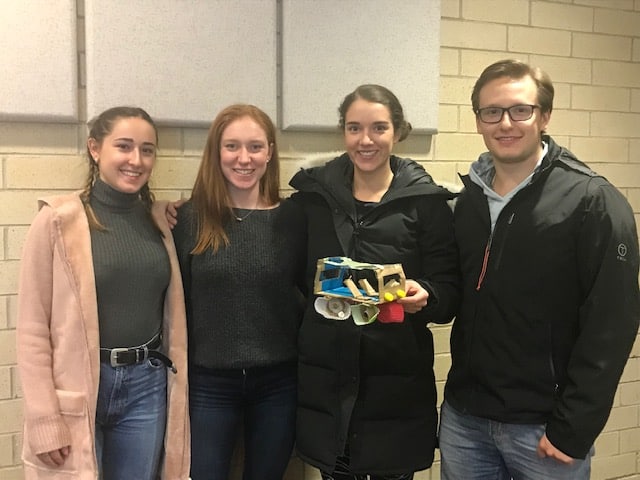During winter quarter in ACTG 3360, Profit Planning and Control class, I created a contest for my students to build a car using target costing and value engineering. Target costing is a management technique that encourages students to think about how companies can better control costs while providing quality and functionality superior to its competition.
Each team was provided with the same materials and respective costs: a large piece of cardboard ($100), egg carton cups ($25 each), Q-tips ($10 each), marshmallows ($5 each), a paper plate ($100), a small bowl ($75), straws ($30 each), cardboard rings ($25 each), muffin tins ($10 each), wire ($10) and a can lid ($20).
Labor and overhead costs were 30% of each team’s direct material costs and added to the total cost of the vehicle. Using a variation of the materials provided, each team was required to design and build a car that would compete in safety, design and features.
The first step was for each team to decide which strategic objective they would strive to achieve: cost leadership or differentiation. Then, they determined a price and profit margin that aligned with their strategy. Lastly, they calculated a target cost based on the desired profit margin less the selling price. Once building began, it was important for each team to build a car with the available materials while maintaining their target cost and providing the most value to their customer.

The AdventureMobile team: Undergraduate students Sofia Lanzafame, Jillian Wickline, Reilly Morrison and Michael King
The AdventureMobile team consisted of undergraduate students Sofia Lanzafame, Jillian Wickline, Reilly Morrison and Michael King. They built a one-of-a-kind vehicle model and won the contest!
The team won the hearts of their market (classmates) by providing a car that would allow users to enjoy the nature of Colorado while also boasting flexibility with extra cargo space and features anyone would enjoy. These features included a sun roof, lots of color options and wheels that support all kinds of terrain.
Students were required to sell their car’s price and its top five features to their peers. The AdventureMobile won 42% of its market, with The Boston Rob coming in at a close second place by securing 25% of the market.

Accounting competition team cars
The AdventureMobile was not the cheapest vehicle engineered for this contest, but it was not the most expensive either. This team’s strategy to differentiate its product supported its price point while maintaining a target cost that resulted in the highest profit margin per car in the class.
Well done, Team AdventureMobile!
Annette Fertig is an adjunct faculty member at Daniels. She joined the School of Accountancy staff in September 2014. She teaches introductory managerial and financial accounting courses and started working with MBA@Denver this past fall. Fertig was awarded the Adjunct Faculty Excellence in Teaching Award in 2018.
